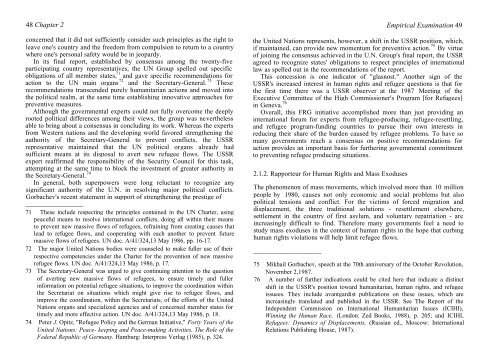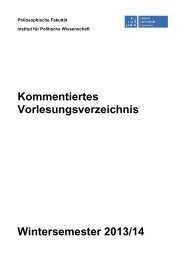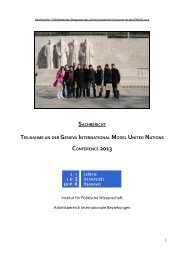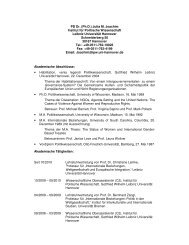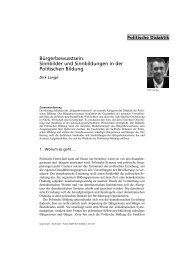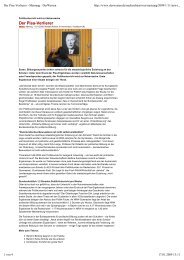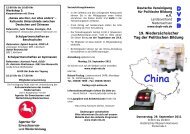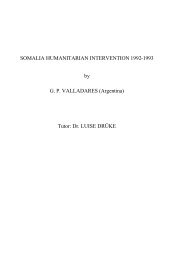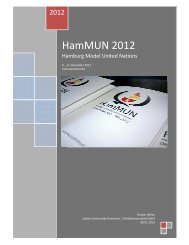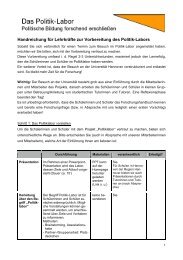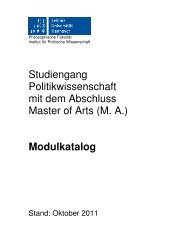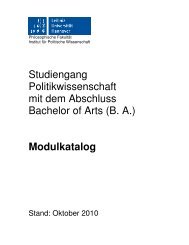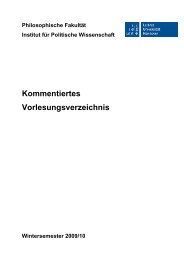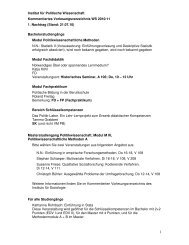Preventive Action for Refugee Producing Situations
Preventive Action for Refugee Producing Situations
Preventive Action for Refugee Producing Situations
Create successful ePaper yourself
Turn your PDF publications into a flip-book with our unique Google optimized e-Paper software.
48 Chapter 2<br />
concerned that it did not sufficiently consider such principles as the right to<br />
leave one's country and the freedom from compulsion to return to a country<br />
where one's personal safety would be in jeopardy.<br />
In its final report, established by consensus among the twenty-five<br />
participating country representatives, the UN Group spelled out specific<br />
obligations of all member states, 71 and gave specific recommendations <strong>for</strong><br />
action to the UN main organs 72 and the Secretary-General. 73 These<br />
recommendations transcended purely humanitarian actions and moved into<br />
the political realm, at the same time establishing innovative approaches <strong>for</strong><br />
preventive measures.<br />
Although the governmental experts could not fully overcome the deeply<br />
rooted political differences among their views, the group was nevertheless<br />
able to bring about a consensus in concluding its work. Whereas the experts<br />
from Western nations and the developing world favored strengthening the<br />
authority of the Secretary-General to prevent conflicts, the USSR<br />
representative maintained that the UN political organs already had<br />
sufficient means at its disposal to avert new refugee flows. The USSR<br />
expert reaffirmed the responsibility of the Security Council <strong>for</strong> this task,<br />
attempting at the same time to block the investment of greater authority in<br />
the Secretary-General. 74<br />
In general, both superpowers were long reluctant to recognize any<br />
significant authority of the U.N. in resolving major political conflicts.<br />
Gorbachev's recent statement in support of strengthening the prestige of<br />
_________________<br />
71 These include respecting the principles contained in the UN Charter, using<br />
peaceful means to resolve international conflicts, doing all within their means<br />
to prevent new massive flows of refugees, refraining from creating causes that<br />
lead to refugee flows, and cooperating with each another to prevent future<br />
massive flows of refugees. UN doc. A/41/324,13 May 1986, pp. 16-17.<br />
72 The major United Nations bodies were counseled to make fuller use of their<br />
respective competencies under the Charter <strong>for</strong> the prevention of new massive<br />
refugee flows. UN doc. A/41/324,13 May 1986, p. 17.<br />
73 The Secretary-General was urged to give continuing attention to the question<br />
of averting new massive flows of refugees, to ensure timely and fuller<br />
in<strong>for</strong>mation on potential refugee situations, to improve the coordination within<br />
the Secretariat on situations which might give rise to refugee flows, and<br />
improve the coordination, within the Secretariats, of the ef<strong>for</strong>ts of the United<br />
Nations organs and specialized agencies and of concerned member states <strong>for</strong><br />
timely and more effective action. UN doc. A/41/324,13 May 1986, p. 18.<br />
74 Peter J. Opitz, "<strong>Refugee</strong> Policy and the German Initiative," Forty Years of the<br />
United Nations: Peace- keeping and Peace-making Activities. The Role of the<br />
Federal Republic of Germany. Hamburg: Interpress Verlag (1985), p. 324.<br />
Empirical Examination 49<br />
the United Nations represents, however, a shift in the USSR position, which,<br />
if maintained, can provide new momentum <strong>for</strong> preventive action. 75 By virtue<br />
of joining the consensus achieved in the U.N. Group's final report, the USSR<br />
agreed to recognize states' obligations to respect principles of international<br />
law as spelled out in the recommendations of the report.<br />
This concession is one indicator of "glasnost." Another sign of the<br />
USSR's increased interest in human rights and refugee questions is that <strong>for</strong><br />
the first time there was a USSR observer at the 1987 Meeting of the<br />
Executive Committee of the High Commissioner's Program [<strong>for</strong> <strong>Refugee</strong>s]<br />
in Geneva. 76<br />
Overall, this FRG initiative accomplished more than just providing an<br />
international <strong>for</strong>um <strong>for</strong> experts from refugee-producing, refugee-resettling,<br />
and refugee program-funding countries to pursue their own interests in<br />
reducing their share of the burden caused by refugee problems. To have so<br />
many governments reach a consensus on positive recommendations <strong>for</strong><br />
action provides an important basis <strong>for</strong> furthering governmental commitment<br />
to preventing refugee producing situations.<br />
2.1.2. Rapporteur <strong>for</strong> Human Rights and Mass Exoduses<br />
The phenomenon of mass movements, which involved more than 10 million<br />
people by 1980, causes not only economic and social problems but also<br />
political tensions and conflict. For the victims of <strong>for</strong>ced migration and<br />
displacement, the three traditional solutions - resettlement elsewhere,<br />
settlement in the country of first asylum, and voluntary repatriation - are<br />
increasingly difficult to find. There<strong>for</strong>e many governments feel a need to<br />
study mass exoduses in the context of human rights in the hope that curbing<br />
human rights violations will help limit refugee flows.<br />
____________________<br />
75 Mikhail Gorbachev, speech at the 70th anniversary of the October Revolution,<br />
November 2,1987.<br />
76 A number of further indications could be cited here that indicate a distinct<br />
shift in the USSR's position toward humanitarian, human rights, and refugee<br />
issuees. They include avantgardist publications on these issues, which are<br />
increasingly translated and published in the USSR. See The Report of the<br />
Independent Commission on International Humanitarian Issues (ICIHI),<br />
Winning the Human Race, (London: Zed Books, 1988), p. 205; and ICIHI,<br />
<strong>Refugee</strong>s: Dynamics of Displacements, (Russian ed., Moscow: International<br />
Relations Publishing House, 1987).


